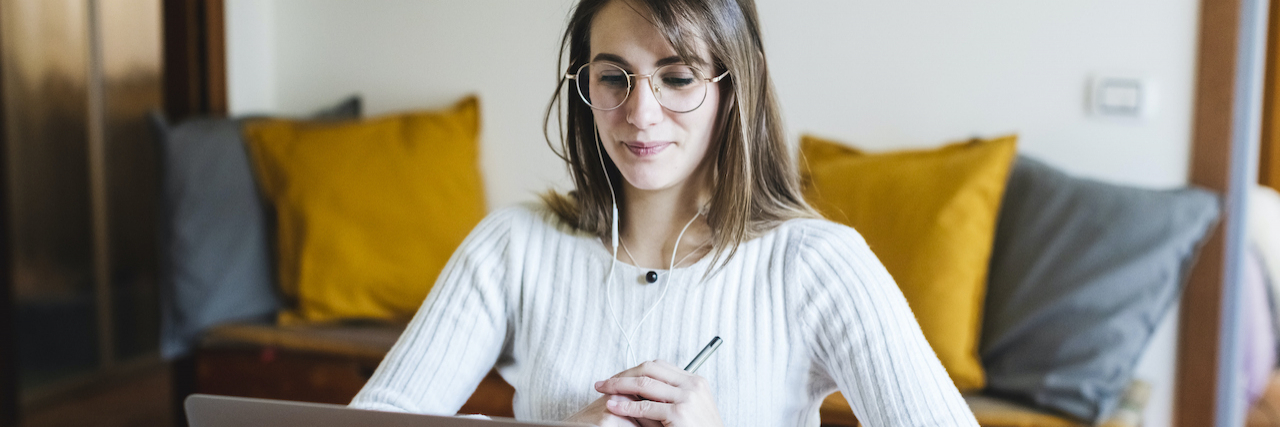I'm a Procrastinator When It Comes to My Eating Disorder — But Not in the Way You Think
Editor's Note
If you live with an eating disorder, the following post could be potentially triggering. You can contact the Crisis Text Line by texting “NEDA” to 741741.
I’m a procrastinator — but not in the way you think.
I stress about projects when I don’t start them early enough. I feel safe and comfortable when I know I have a head-start on my to-do list.
There’s just one problem: I use the stress I feel about procrastinating on deadlines to procrastinate on eating.
In college, I studied so diligently that I would convince myself to study five minutes longer — and then only 10 minutes longer and then just 15 minutes longer — before I ate dinner. As midterms and finals drew closer, I’d find myself reluctantly preparing dinner at 9 or 10 p.m. because I had spent so long doing anything but eating. And when I had too many extracurriculars on my plate, my dubious eating habits would seep into lunchtime — and I wouldn’t eat until the late afternoon.
I didn’t see my habits as unhealthy — I was simply too busy to eat in a typical timeframe. At the time, though, I was completely unaware I had a full-blown eating disorder — and my fashionably late meals were just another symptom.
When I lugged textbooks, kitchenware, and apartment décor home after my college graduation, my “food procrastination” followed me back to my hometown as well. I couldn’t seem to eat lunch on time, and eventually, my untraditional schedule as a respite care worker meant I could continue to procrastinate on eating. I wasn’t working a 9-5 job with a set lunch break, so I could eat whenever I wanted — and my eating disordered-mind took full advantage of my schedule. I know my behavior wasn’t “typical,” but I assumed my internal clock was aligned later than others’ were. It was all just a quirky personal habit — not anything serious.
A couple of years later, I received the shock of my life when I was diagnosed with anorexia nervosa. The diagnosis didn’t feel like it fit me because I was missing so many of the hallmark anorexia symptoms. The reality, though, was that I was subconsciously scared of weight gain, I didn’t eat enough to adequately fuel my body, and I delayed meals so as to avoid triggers. However, I had not yet arrived at the realization that my late meals served a dangerous purpose, so I carried on with putting off every meal until the last possible minute.
When I entered eating disorder treatment, meals were highly regimented. Breakfast at 7:30 a.m. Lunch at noon. Dinner at 5:30 p.m. No exceptions. I was blown away at how early every meal seemed to be skewed, but come mealtime, I ate every bite. I was determined to be the “perfect” eating disorder treatment client — even if it meant giving up my late lunches and dinners.
However, when I left residential eating disorder treatment, my “food procrastination” came back in full force. I had no one telling me when to eat anymore, so when I wasn’t in my part-day treatment program, I took full advantage of my freedom. As I began chipping away at the motivation behind my eating disorder behavior, though, I began to fully realize that I procrastinate on eating meals. Entering treatment brought new triggers — and a renewed desire to distance myself from the complex feelings that ignited my eating disorder — so delaying meals was a surefire way to avoid thinking too much, feeling too much, and recovering too much.
Even now, three years into my eating disorder recovery, I still struggle with “food procrastination.” On days when I feel emotionally numb or struggle with eating disorder thoughts, eating meals on time feels especially daunting. Even buying food at the grocery store can feel like too much to handle — especially if I know I need to buy potentially challenging snack foods. I tell myself that if I postpone the inevitable food challenge outing or grocery shopping trip long enough, it’ll be “too late” to go, and I’ll simply need to cope with the triggers later. I force myself to believe that eating meals late is more recovery-oriented than not eating them at all — and in doing so, I reinforce my eating disorder.
I still tell myself that I’ll eat “after I finish this homework,” “after I’m done working,” or “after this YouTube video ends,” but I also know I have accountability. My family gently encourages me to eat meals in a “typical” timeframe, and my friends hold me accountable for picking up my favorite foods no later than when I say I will. I also remind myself that food is necessary, and delaying inevitable triggers may just increase my anxiety. Sometimes I wonder if I’ll ever stop procrastinating on eating — but I’m now aware of why I delay meals and snacks, I have support, and I’m working hard to kick this eating disorder behavior to the curb.
Getty image by massimo colombo

